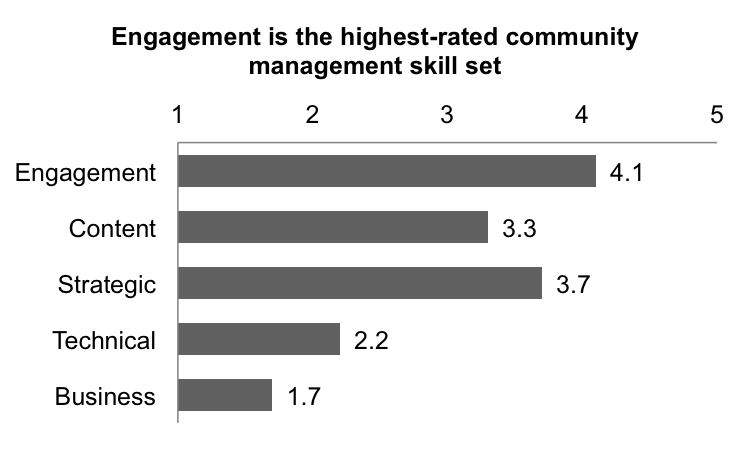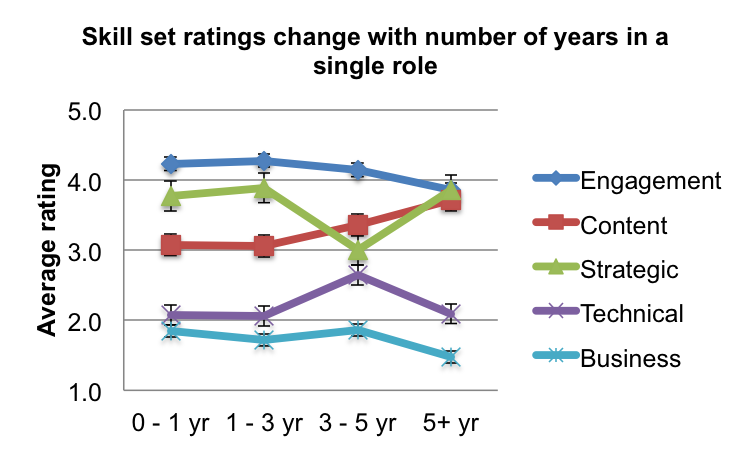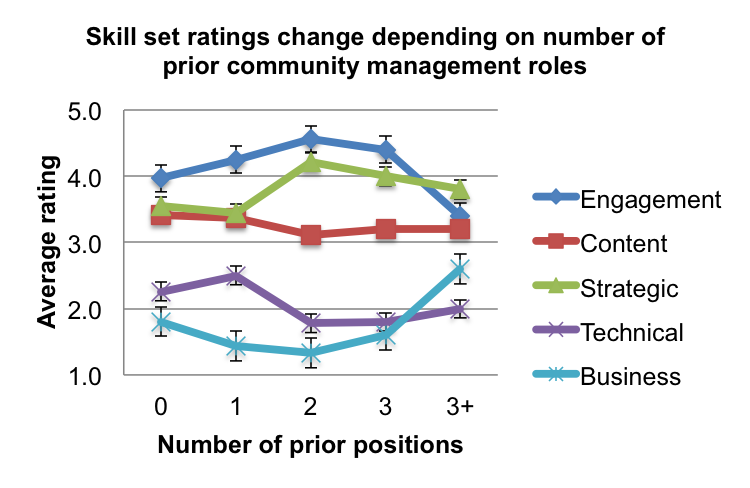So far, our analysis of the State of Scientific Community Management survey has addressed scientific community managers’ education and training, the types of organizations that hire them, and the funding landscape for community management.
In this post we explore the skillsets that scientific community managers rely on in their current roles. We asked our survey respondents to rate the importance of 5 key skill sets, originally delineated by The Community Roundtable for the broader field of community management outside science. Read on to learn about which skill set ranks highest, and how the rankings change depending on seniority.
Engagement skills are the most important
Looking at all scientific community managers who responded to the survey, engagement skills (those related to member and behavioral activities) are most important, while business skills rank the lowest (Figure 1):

These results are consistent with the rankings of community managers in industries outside of science, according to the research performed by The Community Roundtable (Figure 2).

What skills are scientific community managers specifically using within the highly ranked categories of Engagement, Strategic, and Content skills? Some of their highest-valued skills included facilitating connections; listening, analyzing, and writing; developing community and content strategy; planning events and communications; and figuring out how to measure and evaluate engagement techniques. The list is very similar to the 11 Most Valuable Community Management Skills that The Community Roundtable reported.
Experienced scientific community managers do more strategy and content work, less engagement
Over their years in a given position, community managers’ valuation of skill sets shifts notably (Figure 3). Engagement skills are most important for community managers with 1 to 3 years on the job. Over time in the role, community managers rank the Content skill set more highly while Engagement declines. This may reflect time spent seeding the initial community by inviting and conversing with new members. It may also reveal a ramp up period during which the community manager becomes familiar enough with a field to be able to confidently and efficiently increase the amount of content (s)he produces.

An interesting shift occurs at the 3-5 year mark for scientific community managers in a single role. The importance of Strategic skills declines while Technical skills increase in value. By 5 years or more, however, our respondents ranked Engagement, Content, and Strategic skills equally highly but deprioritized Technical and Business skills.
According to one model of community growth, once a community reaches maturity, the community manager spends less time seeding conversations and inviting new members because the community has become somewhat self-sustaining. Does the rise in content creation in our data argue against this? Is it something particular to the scientific content of our communities or something else about the changing state of the community (such as old members leaving and a new intake joining) with a periodicity of 3+ years?
With more positions under their belt, scientific community managers shift focus
Many respondents have had community management roles prior to their current one. From the perspective of counting how many positions they’ve held we see some distinct changes in their ratings of skill sets (Figure 4): If you get to your 3rd community management role (the 2-prior mark), it’s likely your valuation of Strategic skills jumps up and Technical ones jumps down.

Scientific community managers with 3 prior community management roles seem to rely less on Engagement skills and more on Business skills. These community managers may have increased in seniority and may use business skills to help them manage programs and people.
Remember that a community manager’s number of years on the job or the number of positions held doesn’t necessarily correspond to the maturity of the community itself. In spite of this, in communities considered by The Community Roundtable to be moving into more mature stages, the Business skill set rose in importance for those community managers as well (Figure 5).
